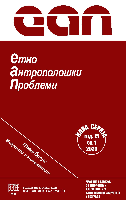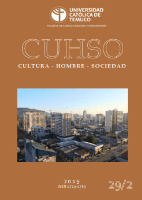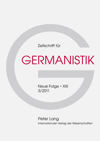
OSTERREICHISCHE ZEITSCHRIFT FUR VOLKSKUNDE
Scope & Guideline
Unveiling Austria's Folklore and Ethnology
Introduction
Aims and Scopes
- Folklore and Cultural Heritage Studies:
The journal emphasizes the study of folklore as a vital aspect of cultural heritage, exploring traditional practices, narratives, and objects in contemporary contexts. - Digital Ethnography and Technology:
It incorporates discussions on digital ethnography, examining how technology influences cultural practices and the representation of heritage in the digital age. - Interdisciplinary Approaches:
The journal promotes interdisciplinary methodologies, integrating perspectives from anthropology, sociology, and cultural studies to provide a comprehensive understanding of cultural phenomena. - Cultural Memory and Identity:
A significant focus is placed on cultural memory and identity, particularly how these concepts manifest in various communities and historical contexts, reflecting on their implications for society. - Urban and Rural Studies:
The examination of urban and rural dynamics is a core area, investigating how cultural practices differ and evolve in these contrasting environments.
Trending and Emerging
- Cultural Activism:
There is a growing trend toward exploring cultural activism, particularly in response to social and political issues, highlighting how cultural practices can serve as forms of resistance and identity formation. - Digital Heritage and Virtual Exhibitions:
The rise of digital heritage and virtual exhibitions is a prominent theme, with articles discussing the implications of technology for the preservation and representation of cultural heritage. - Ethnographic Methodologies in Crisis Contexts:
A significant focus on ethnographic methodologies applied in crisis contexts, particularly in relation to cultural heritage protection and community support during conflicts, is emerging. - Intersectionality in Cultural Studies:
Research that examines intersectionality within cultural studies is gaining prominence, reflecting a nuanced understanding of how various social identities intersect and influence cultural practices. - Environmental and Ecological Ethnography:
The journal is increasingly addressing environmental and ecological concerns, exploring how cultural practices relate to sustainability and environmental justice.
Declining or Waning
- Traditional Folklore Practices:
There has been a noticeable decrease in articles focusing solely on traditional folklore practices, as the journal shifts towards more contemporary interpretations and applications of folklore in modern society. - Historical Analysis of Folklore:
Research focused on historical analysis of folklore and its origins appears to be less prevalent, with a growing emphasis on current cultural expressions and their implications. - Static Cultural Representations:
The exploration of static cultural representations, such as specific artifacts or traditional performances, is diminishing as the journal increasingly favors dynamic interactions and contemporary cultural practices. - Regional Studies in Isolation:
Studies that focus solely on specific regional folklore without connecting to broader cultural or transnational contexts are becoming less common, indicating a trend towards more globally interconnected research. - Single-Disciplinary Perspectives:
There is a decline in research that adheres strictly to one disciplinary viewpoint, as the journal increasingly values interdisciplinary approaches that incorporate multiple perspectives.
Similar Journals

VOLKSKUNDE
Connecting Scholars through Cultural InquiryVOLKSKUNDE is a distinguished academic journal dedicated to the study of folklore and cultural traditions, published by CENTRUM STUDIE DOCUMENTATIE based in Belgium. With an ISSN of 0042-8523, this journal serves as an essential platform for researchers, scholars, and students interested in the rich tapestry of cultural heritage and ethnographic research. Although currently not available as an open-access publication, VOLKSKUNDE is committed to disseminating high-quality scholarly articles that provide critical insights into the complexities of cultural practices across diverse societies. The journal’s objective is to foster academic discourse and stimulate inquiry into folklore studies, promoting a deeper understanding of cultural dynamics. By engaging with a broad range of topics within its scope, VOLKSKUNDE is an invaluable resource for anyone looking to deepen their knowledge in the field of folkloristics.

Lares-Quadrimestrale di Studi Demoetnoantropologici
Unraveling Cultural Practices Through Scholarly InquiryLares-Quadrimestrale di Studi Demoetnoantropologici is a prominent scholarly journal dedicated to the fields of demoethnoanthropology, exploring the intersections of cultural practices, traditions, and social dynamics. Published by CASA EDITRICE LEO S OLSCHKI, this esteemed journal provides an academic platform for researchers and practitioners to disseminate original research findings and critical reviews, delving into ethnographic studies and community-based inquiries. With an ISSN of 0023-8503 and an E-ISSN of 2036-511X, Lares is recognized for its commitment to scholarly excellence and its contribution to advancing knowledge within its field. Although it currently categorizes as non-open access, the journal remains highly regarded among academics, ensuring the widespread dissemination of significant research. The journal's base in beautiful Florence, Italy, enhances its cultural richness and appeal, making it a notable reference point for scholars dedicated to the study of human cultures and social systems.

Slovensky Narodopis-Slovak Ethnology
Exploring the Depths of Slovak CultureSlovensky Narodopis-Slovak Ethnology is a leading academic journal dedicated to the exploration of ethnology and cultural studies, published by the Slovak Academy of Sciences at the Institute of Ethnology. With an Open Access policy since 2013, it strives to make high-quality research readily accessible to a global audience, enhancing the dialogue around Slovak cultural heritage and broader anthropological topics. The journal holds a notable position in the field, currently ranked Q2 in anthropology for 2023, indicating its substantial contribution to the discipline. It is indexed in Scopus, with a current rank of 245 out of 502 in the Social Sciences category, reflecting its value within the academic community. Researchers and students alike can look forward to a rich array of original research articles, reviews, and essays that not only delve into Slovak ethnology but also engage with international perspectives, thereby enriching the understanding of cultural dynamics and practices.

Etnoantropoloski Problemi-Issues in Ethnology and Anthropology
Bridging research and practice in an interconnected world.Etnoantropoloski Problemi-Issues in Ethnology and Anthropology, published by the University of Belgrade, Faculty of Philosophy, is a prestigious open-access journal dedicated to advancing the fields of ethnology and anthropology. With its ISSN 0353-1589 and E-ISSN 2334-8801, the journal has been a crucial platform since 2006, facilitating the dissemination of innovative research and critical discussions among scholars worldwide. As an open-access journal, it ensures that valuable insights and findings are readily accessible, promoting knowledge sharing and collaboration across the academic community. The journal aims to explore and address contemporary issues in cultural studies, social dynamics, and human behavior, emphasizing the relevance of ethnological and anthropological research in understanding our increasingly interconnected world. Researchers, professionals, and students alike will find Etnoantropoloski Problemi an essential resource for staying informed about the latest developments and debates within these dynamic disciplines.

Acta Baltico-Slavica
Connecting Scholars Across Baltic and Slavic DisciplinesActa Baltico-Slavica, an esteemed academic journal published by the Polish Academy of Sciences, Institute of Slavic Studies, serves as a vital platform for the exploration of Slavic cultures, languages, and historical narratives. Since its transition to Open Access in 2014, the journal has fostered inclusivity and accessibility, allowing researchers, professionals, and students to engage with cutting-edge scholarship in the fields of History, Linguistics and Language, and Literature and Literary Theory. With a commendable impact as indicated by its category quartile rankings (Q2 in History and Literature, Q3 in Linguistics), and Scopus rankings reflecting its significance within the academic community, Acta Baltico-Slavica not only contributes to the rich tapestry of scholarship surrounding the Baltic and Slavic regions but also encourages interdisciplinary dialogue. The journal’s commitment to advancing knowledge across its fields of study makes it a prominent destination for scholarly discourse and research inquiry.

Zeitschrift fur Empirische Kulturwissenschaft
Fostering Scholarly Discourse in Cultural ResearchZeitschrift fur Empirische Kulturwissenschaft is a prominent academic journal dedicated to the empirical study of cultural phenomena. Published by WAXMANN VERLAG GMBH, this journal serves as a vital platform for researchers and professionals interested in the intersections of culture, society, and empirical research methodologies. With its ISSN 2752-1591 and E-ISSN 2752-1605, it aims to foster scholarly discourse and innovation in the field of cultural studies. The journal encourages contributions that explore diverse cultural contexts and practices, providing insights that are both rigorous and relevant. Although the journal does not currently offer open access, its commitment to disseminating high-quality research makes it a crucial resource for anyone looking to deepen their understanding of empirical culture studies. Zeitschrift fur Empirische Kulturwissenschaft plays an important role in advancing the academic exploration of culture, contributing to the landscape of interdisciplinary research and supporting the next generation of scholars and practitioners.

Folklore-Electronic Journal of Folklore
Unveiling the Myths and Traditions of SocietiesFolklore-Electronic Journal of Folklore is a pioneering academic platform dedicated to the expansive field of folklore studies, published by the esteemed Estonian Literary Museum. With an ISSN of 1406-0957 and an E-ISSN of 1406-0949, this journal has established itself as a notable contributor to the scholarship on cultural expressions and traditions, particularly in the context of Estonia and beyond. Operating under an open access model, the journal aims to disseminate high-quality research that illuminates the rich tapestry of human folklore, mythology, and cultural practices across various societies. Recognized for its impact, it has been categorized in the Q3 quartile for Anthropology and Q2 for Cultural Studies in 2023, reflecting its relevance and rigorous academic standards. By ranking #436 out of 1304 in Cultural Studies and #267 out of 502 in Anthropology according to Scopus, the journal serves as a vital resource for researchers, professionals, and students interested in the interplay between folklore and contemporary societal issues. Overall, the Folklore-Electronic Journal of Folklore not only promotes scholarly exchange but also invites contributions that push the boundaries of traditional folklore research.

CUHSO-Cultura-Hombre-Sociedad
Exploring the Intersections of Culture and SocietyCUHSO-Cultura-Hombre-Sociedad is an esteemed academic journal published by UNIV CATOLICA TEMUCO, dedicated to the fields of culture, humanities, and social sciences. Since its inception in 1984, this Open Access journal has provided a platform for scholarly discourse, fostering an environment for researchers, professionals, and students to disseminate their findings and engage with contemporary issues in society. CUHSO’s mission is to promote interdisciplinary research that addresses the complexities of human culture and social dynamics, making it a crucial resource for those invested in understanding societal transformations. With an ISSN of 0716-1557 and an E-ISSN of 0719-2789, the journal ensures wide accessibility to its content, while also contributing to the global academic conversation through open access. As the journal continues to expand its reach and impact, it remains a vital resource for academics and practitioners alike, bridging the gaps in cultural and societal understanding.

Rusin
Navigating Complex Histories and Evolving LanguagesRusin is a distinguished academic journal published by ASSOC RUS in Moldova, playing a pivotal role in the multidisciplinary landscape of the humanities and social sciences. With an ISSN of 1857-2685 and an E-ISSN of 2345-1149, this journal has been circulating since 2011, amassing a significant reputation by 2023 as evidenced by its prestigious quartile rankings: Q2 in Anthropology, Q1 in History, Q2 in Linguistics and Language, Q1 in Literature and Literary Theory, and Q3 in Sociology and Political Science. The journal boasts remarkable Scopus rankings, including an impressive rank of #145 in Literature and Literary Theory, placing it in the 86th percentile among its peers. Although currently not open access, Rusin serves as an essential platform for researchers, professionals, and students, aiming to further the understanding of complex cultural and historical narratives, language evolution, and sociopolitical dynamics. As an informative resource, it fosters critical dialogue and interdisciplinary collaboration, solidifying its importance in the publishing realm within the humanities and social sciences.

ZEITSCHRIFT FUR GERMANISTIK
Advancing Scholarly Discourse in Germanic StudiesZEITSCHRIFT FUR GERMANISTIK, published by PETER LANG GMBH, is a distinguished academic journal that serves as a vital resource in the fields of German studies, literature, linguistics, and cultural analysis. With an ISSN of 0323-7982, this journal provides critical insights and promotes scholarly discourse surrounding the evolving landscapes of German language and literature. Although it operates under a traditional access model, readers and researchers benefit from its rigorous peer-reviewed articles that span decades of intellectual inquiry. Historically featured in Scopus, the journal is noted for its impactful contributions, ranking 244th in Literature and Literary Theory and 406th in Linguistics and Language, highlighting its importance in the academic community. Situated in Bern, Switzerland, ZEITSCHRIFT FUR GERMANISTIK not only caters to scholars seeking to enrich their understanding of Germanic studies but also aims to bridge gaps across interdisciplinary borders, fostering a deeper appreciation of the cultural narratives that shape our world.